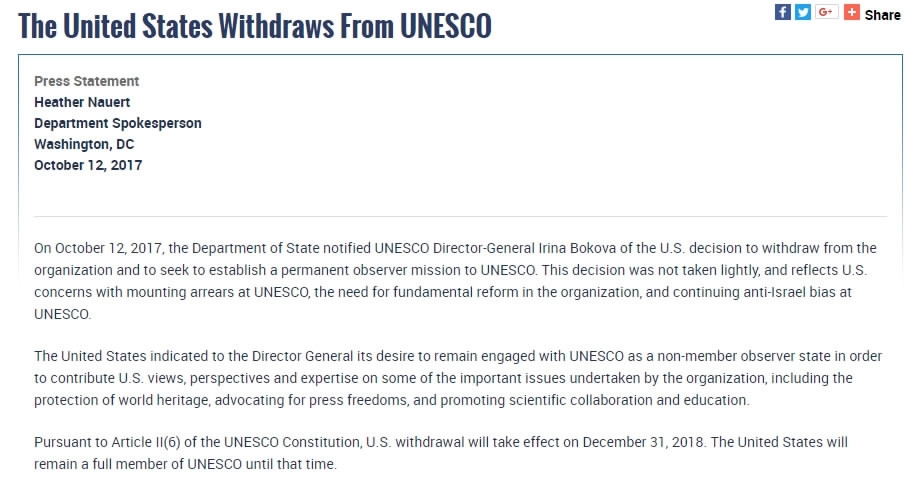
Opinions
17:02, 14-Oct-2017
Opinion: Can the US continue to lead?
Guest commentary by Guojiren

This latest move has surprised the world. There might be 1,000 reasons for the US to take action against UNESCO.
But I have to say that it reflects the fact that the US is becoming increasingly helpless, impatient and even desperate with the changing world or world order.

The official statement of withdrawal by the US State Department / US State Department Photo
The official statement of withdrawal by the US State Department / US State Department Photo
The world today is no longer dominated by the US and a handful of Western powers. The world order is evolving into a new one in which more emerging powers have a bigger voice.
The question is whether the US can continue to lead the world. It is getting harder and harder for the country to play a dominant role, and whether the US continues to stick to the world order which is increasingly deviating from the interests of its designers will be interesting to see.
UNESCO is an organization set up on the initiative of the French as well as the British and supported and joined by the US. It's part of the world order designed by the US and its allies.
I should say it's a good idea to promote peace through cultivating peaceful thinking and through exchanges in education, science and culture. But any such international organizations must be led and controlled by the West, the US in particular, according to the logic of some Western powers.
However, things are changing. The US dominance is more and more being challenged. In the 1960s, there were two great debates going on in the world, one at the United Nations based on developing nations calling for a new economic order, the other at UNESCO calling for a more fair and just information order.

The UNESCO headquarters in Paris. /VCG Photo
The UNESCO headquarters in Paris. /VCG Photo
That's due to the fact that more third-world countries gained independence and joined the UN and UNESCO.
But they felt their economies were still under the control of the West and that the international information flow was also controlled by the West. That's why they were calling for new world economic and information orders.
These were the early efforts of developing countries trying to challenge Western dominance in the world order designed by the West. Although the voices of the developing countries were loud and clear, the world didn't and couldn't do anything, because back then the developing countries were weak both economically and politically.
But now, as more developing countries emerge stronger on the world stage, Western dominance is more seriously challenged, at the United Nations, UNESCO and many other international institutions such as the IMF and World Bank.
Moreover, even some of America's allies are also going their own way and even becoming some of the strongest opponents of US policies. Gone are the days when the United States can easily rally support under its banner.

A general view of the United Nations Educational, Scientific and Cultural Organization (UNESCO) headquarters is seen at dusk in Paris, France, October 12, 2017. /Reuters Photo
A general view of the United Nations Educational, Scientific and Cultural Organization (UNESCO) headquarters is seen at dusk in Paris, France, October 12, 2017. /Reuters Photo
Now, how does the US deal with the situation? It must pay a bigger price in order to continue to lead.
Even if it can still cling on to the leadership, can it steer the world toward the direction it wants? It seems the US government now is reluctant to take more responsibilities and getting to the last and desperate resolve, withdrawal from the world order it helped to build.
I have to say it's not a wise choice.
I would suggest that the US should accept the reality and make room to accommodate emerging powers and cooperate with them in dealing with the world's pressing issues. It should go with multilateralism instead of unilateralism.
The world cannot and should not be always dominated by one or a few powers. I would say that the US can still lead the world.
It can continue to lead by strengthening such areas as technology and innovation, high-end manufacturing, services and culture. The US should lead by doing the right things such as humanitarian aid, assisting poor countries and making peace not war, even at a higher cost.
It should lead by example and not by hegemony.
Changing with the times. That's the way to make America great again.
(The article reflects the author's opinion, and not necessarily the views of CGTN.)

SITEMAP
Copyright © 2018 CGTN. Beijing ICP prepared NO.16065310-3
Copyright © 2018 CGTN. Beijing ICP prepared NO.16065310-3